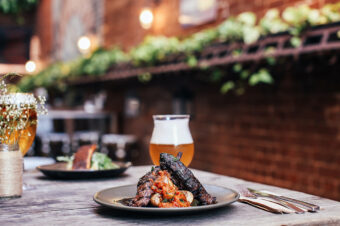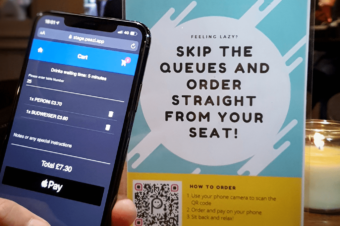Last month, we took a group of operators on a study tour of emerging concepts in Chicago. It was also a chance to catch-up on the key trends shaping the world’s most developed out-of-home foodservice market.
The UK may have made vaulting strides in terms of the development of sophisticated brands offering customers ever wider choice. But a trip to the US is a reminder of what a powerhouse the country’s foodservice industry is, having had a 30 year start on the UK in terms of the development of systemised out-of-home.
Figures from Technomic shows that big brands can carry on growing in the domestic market – McDonald’s had added $15bn of sales in the US market in the past decade to grow total sales to the $35m mark. There are now no fewer than 15 companies with sales greater than our largest company, Whitbread. And there are six more whose sales are around the same level.
Unmatched global position as export successes
Furthermore, sophisticated US limited service brands also have an unmatched global position as export successes. The top 200 US brands operate more than 80,000 restaurants outside of the US, with, again, McDonald’s leading the way with 19,412 sites. The US market has become intensely competitive and many major companies have become increasingly reliant on overseas markets for growth. Yum! Brands now earns more profit in the massive Chinese market than anywhere else thanks to the expansion of the Kentucky Fried Chicken brand. And at some point this year, Domino’s Pizza will have more sites overseas than it does in the United States.
The growth of US brands overseas is testament to the power of franchising as a capital-lite instrument for expansion. Five of the six biggest franchisors by sales in the US are in the foodservice category – and they account for an astonishing 40% of the top 200 in sales terms. Systemised foodservice systems lend themselves beautifully to franchising. Bigger normally means slower rates of expansion. But it doesn’t apply at the top of the franchising tree. The largest franchise systems have, in fact, been increasing their lead over the others. The top ten franchise systems grew sales by 13.4% last year and McDonald’s added 15.8% to its sales line – compared to an average of 8.9% across the whole of the top 200 companies.
There’s scope the other way as well
The other noticeable things about the franchise model is its flexibility. As margins compress, some companies have moved swiftly to franchise more company-owned sites. But there’s scope the other way as well. Panera Bread, Five Guys and Buffalo Wild Wings, all performing exceptionally well through the recession, have been buying back sites from franchisees because their profit margins have been growing.
More broadly, there’s no doubt that the US restaurant scene benefits from the 40 years of cumulative experience generated by the creation of so many large foodservice companies. Good, original ideas need systems for successful implementation. Our trip to Chicago took in many original and emerging concepts. It’s no surprise that many of these are founded by executives of the larger companies deciding it is time to start their own foodservice concepts. The same process is in train in the UK. TLC Inns’ Jo Drain, Innventure’s Chris Gerard, Redcomb Pubs’ Dan Shotton all gained experience within Mitchells & Butlers, or its earlier guises, before striking out on their own.
The development of a UK-based world-beating food-service concept
Similarly, the chief executive of YO! Sushi, Robin Rowland, gathered experience at S&N Retail and The Restaurant Group, among others, before joining YO! Sushi. Here is one of the companies that provides the brightest prospect of the development of a UK-based world-beating food-service concept, one that might eventually bear comparison with the US brands that have succeeded in a multitude of different markets. Rowland is bullish about the prospects for YO! Sushi, based on early success across a handful of international markets. The creation of such exportable brands will be proof that the UK has developed world-beating foodservice expertise. The UK is certainly never likely to match the US in terms of global success, but it stands the chance of occupying the same position the UK holds in the music industry, a creditable second place, providing actual balance of trade benefits through franchised revenue streams flowing into the UK.
One of our attendees on the Chicago trip was sector investor Luke Johnson, who has built and sold brands such as PizzaExpress, Strada and Giraffe. He told me of his regret that he wasn’t operating in the US so that PizzaExpress might have grown to four or five times its current size. Well, perhaps, a challenge with his next set of sector investments will be to take them international, turning them into world-beaters. How about it, Luke?








Leave a Reply